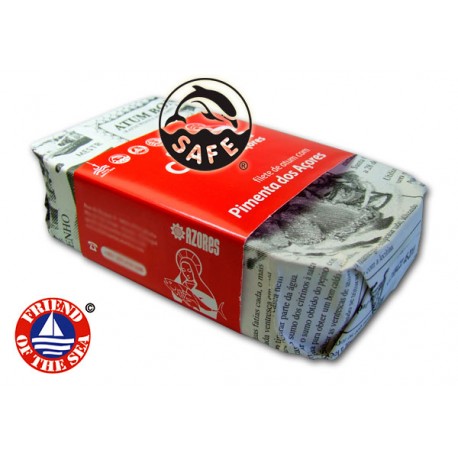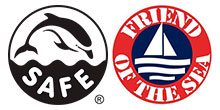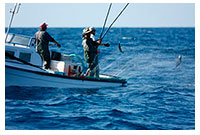 View larger
View larger
Tuna fish fillet with hot pepper from the Azores 120g
SC20309
New product
Premium quality tuna fish
The all times favorite tuna fish with hot pepper from the Azores islands.
One true gourmet tuna fish.
Heir of an old cannery tradition we bring to you the best tuna fish prepared according to artisanal methods used by the old cannery masters.
Data sheet
| Export Box: | 24 cans |
| Shelf Life | 5 Years |
More info
Pole & Line Fishing - Tuna Fish
Pioneers in the value of the sea and environment
 The classification “Dolphin Safe” and “Friend of the Sea”
The classification “Dolphin Safe” and “Friend of the Sea”
As ecological recognition and appreciation, tuna fishing in the Azores, known as “Pole & Line” is certified since 1998 by the nongovernmental organization Earth Island Institute as “Dolphin Safe”, due to its lesser predatory characteristics, and since 2001 as “Friend of the sea”, the first tuna fishing method in the world to be awarded such certification.
Pole & Line” fishing, a sustainable method.
As it is an artisanal method, the “Pole & Line” fishing requires all the experience of the Island’s fishermen. They begin by detecting the presence of tuna through binoculars. Then, they make their approach, turn off the engines and turn on the showers that simulate the escape of small fish, from which the tuna feeds, which hides the fishermen from their field of vision. After, they throw the bait overboard to attract the school and start the fishing activities. It is an example that allows fishermen to catch only enough fish without endangering other species or smaller fish. Unlike what happens in trawling practiced by large commercial fleets, the centenary arts of “Pole & Line”, practiced by the tuna boats of the region, are considered environmentally friendly, because they allow the fisherman to choose the fish and thus preventing unnecessary catches.
 Sustainability
Sustainability
The global trend towards the exploitation of tuna by large commercial fleets is countered in the Azores by a commitment to quality over quantity.
The tuna fish is caught on the Azorean sea, using the Pole and Line method (1 man, 1 fishing rod, 1 fishhook, 1 tuna fish) without any sort of predatory activity, being the only fishing method to be considered Dolphin Safe and environmentally sustainable. It is then manually laboured in the factory.
The tuna fish is manually laboured, as well as the peeling and preparation of all of the ingredients for the tuna paste, as well as filling the containers and labelling them.
 All of our tuna pastes are manually laboured, without any kind of emulsifiers, sweeteners, preservatives or any sort of additives or technological aids. Thus, it’s basically a handmade product.
All of our tuna pastes are manually laboured, without any kind of emulsifiers, sweeteners, preservatives or any sort of additives or technological aids. Thus, it’s basically a handmade product.
Its ingredients, such as the milk, onions, peppers, garlic, parsley, red pepper paste, etc., all have their origin on the Azores islands as well, where all of the ingredients on this recipe are grown and cropped. Once again, this is an exclusively handcrafted product, where the onions, garlic and parsley, are all manually cut with all the love and care of the Azores people.
The Azorean Red Pepper has a medium spicy taste in the mouth that lasts but not intensely hot, therefore it lends a spicy flavour without overlapping the other flavours of the food.
The pepper sauce manufacturing techniques relies on cutting the chili pepper, taking its seeds and smashing it until it gets soft. Several days in a terracotta container with salt, among other secret technics, will do the final taste.
In the last few years, consumption of all peppers has increased in general. Hot chili pepper contain vitamin C and A and is also an excellent source of fiber.
The Azorean typical red pepper is very close to a variety of red pepper of Guinea and Benin coasts, where it seems to have come at the time of Portuguese spice trade routes. Besides the red pepper (sometimes called Piri-piri), the main varieties are the Horn-of-Pepper Goat (Corno-de-Cabra) and the Earth Pepper (or Grada - Pimenta da Terra).





